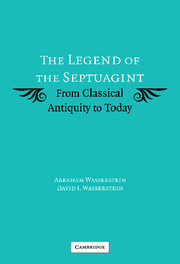Book contents
- Frontmatter
- Contents
- Preface and Acknowledgments
- Abbreviations
- Introduction
- 1 The Letter of Aristeas
- 2 The Hellenistic Jewish Tradition
- 3 The Rabbis and the Greek Bible
- 4 The Ptolemaic Changes
- 5 The Church Fathers and the Translation of the Septuagint
- 6 Among the Christians in the Orient
- 7 The Muslims and the Septuagint
- 8 Yosippon and the Story of the Seventy
- 9 Karaites, Samaritans and Rabbanite Jews in the Middle Ages
- 10 The Septuagint in the Renaissance and the Modern World
- Conclusion
- Appendix: In Partibus Infidelium: Zosimus of Panopolis
- Bibliography and Sources
- Index
5 - The Church Fathers and the Translation of the Septuagint
Published online by Cambridge University Press: 17 July 2009
- Frontmatter
- Contents
- Preface and Acknowledgments
- Abbreviations
- Introduction
- 1 The Letter of Aristeas
- 2 The Hellenistic Jewish Tradition
- 3 The Rabbis and the Greek Bible
- 4 The Ptolemaic Changes
- 5 The Church Fathers and the Translation of the Septuagint
- 6 Among the Christians in the Orient
- 7 The Muslims and the Septuagint
- 8 Yosippon and the Story of the Seventy
- 9 Karaites, Samaritans and Rabbanite Jews in the Middle Ages
- 10 The Septuagint in the Renaissance and the Modern World
- Conclusion
- Appendix: In Partibus Infidelium: Zosimus of Panopolis
- Bibliography and Sources
- Index
Summary
Among Christians, the legend of the translation grew and developed a great deal, but differently from the way it changed among the Jews. Principally this was because of the different status accorded to the Greek translation of the Bible itself among followers of the two faiths. Among Jews, the Greek version of the Bible gradually became less and less important. The invention of the legend of the miracle among Jews in the narrow space of time between 80 and 117 was a happy marriage of need and opportunity. The moment the invention of the miracle could serve any purpose passed almost as rapidly. Among Christians, on the other hand, things went the other way. The Bible was of vast importance from the beginning, the Bible in Greek almost as early. The genesis of the Greek version came to be seen as a matter of great importance too; the story of the origins of that Greek version became closely intertwined with and reflecting the history of that version itself.
The early Christians took over the Jewish legend, but they made changes to it; as will be seen, they probably needed to do so. Thus Origen (c.e. 185–254), who contributed more than any other ancient scholar to the investigation of the biblical text and its various versions, did his work in the first place for statistical purposes. He aimed at discovering the quantitative differences between the LXX and the Hebrew text in order to provide material for Jewish–Christian disputation.
- Type
- Chapter
- Information
- The Legend of the SeptuagintFrom Classical Antiquity to Today, pp. 95 - 131Publisher: Cambridge University PressPrint publication year: 2006



